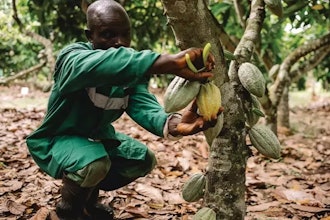WICHITA, Kan. (AP) — Kansas farmers remain leery of the scaled-down farm bill passed by the U.S. House as they wait to see what, if anything, actually makes it into law. But the competing versions for now preserve the one thing most cherished here — crop insurance subsidies.
Kansas Farm Bureau president Steve Baccus was stoic about the legislation's future Friday as he returned from Washington, D.C., to his farm in Ottawa County where he grows wheat, corn and other crops. He remained uneasy about splitting the farm programs from the controversial food stamp spending, but was enthused about how much remained for farmers given the present climate of budget cuts.
"By and large, this is a good bill for Kansas agriculture," Baccus said. "This is very similar to the first one they voted on and defeated. It is very similar to the farm bill that the Senate passed."
The bill currently maintains conservation programs and keeps export market development and assistance programs that promote U.S. agricultural products overseas. And most importantly, especially in the Midwest, it keeps the crop insurance program, he said.
But gone from both the House and Senate versions of the bill are direct payments, subsidies that are paid regardless of crop yield or market price.
"We talked to a lot of producers all across the country. They agreed it was time to get rid of the direct payments — you couldn't justify them," Baccus said. "Most people in agriculture felt like they were unnecessary."
Kansas ranks sixth among the states in the amount of farm program subsidies it receives, with Kansas farmers collecting $927 million in agricultural subsidies last year, according to a database compiled by the Environmental Working Group from Agriculture Department statistics. That includes $301 million in direct payments collected by the state's farmers in 2012.
What worries crop insurance experts like Art Barnaby, a Kansas State University Extension specialist in risk management, is a provision in the Senate version of the farm bill called a "means test" that would keep farmers with adjusted gross incomes of more than $750,000 from qualifying for subsidized crop insurance premiums. The House version just passed contains no such income cap.
While most farmers would not now be impacted by such a high cap, Barnaby is concerned that if the farm bill version which emerges from the conference keeps one it would open the door to lowering the cap in subsequent years to easily cut the crop insurance program.
The all-Republican congressional delegation from Kansas split on the House vote, with U.S. Rep. Tim Huelskamp voting against both farm bills versions that reached the House floor. Huelskamp's office did not respond to phone and email messages seeking comment.
A farmer himself, Huelskamp represents one of the nation's largest farming districts. Farmers in his sprawling congressional district alone collect more than half of all the agricultural subsidies paid in Kansas.
U.S. Rep. Mike Pompeo voted against the first farm bill put on the House floor, but supported the second House version that stripped the nutrition programs. The state's other two representatives supported both House versions of the farm bill.
"I could not support the previous Farm Bill because it was barely a "Farm Bill," as it was primarily a food stamp bill," Pompeo said in a statement. "While this new farm-focused bill is far from perfect, it is an improvement that I can support."






















